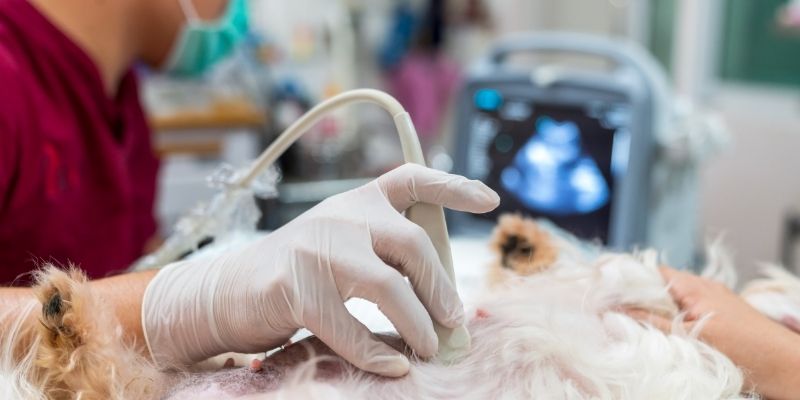Dogs may have health or maintenance issues during their lifetime. A lot of these may involve their vital organs like kidneys or heart. Ultrasound is recommended by vets as a safe and non-invasive investigation tool to determine the reasons for dogs’ distress. Ultrasound in a dog guides effective treatment for various afflictions during their lifespan that demand attention. It is widely used to determine litter size and numbers.
I am very focused on keeping my beloved canine in full health as a pet parent. I find ultrasounds to be easy on dogs. They produce an image of the goings-on within, upon which further course of action is undertaken. Having said that, owners need to know how accurate is ultrasound in dogs.
Do you have a specific question about the accuracy of ultrasound for dogs? Then use the table of contents below to jump to the most relevant section. And you can always go back by clicking on the black arrow in the right bottom corner of the page. Also, please note that some of the links in this article may be affiliate links. For more details, check the Disclosure section at the bottom of the page.
Here's what we'll cover:
What is an ultrasound, and how reliable is it in dogs?
Ultrasound is a form of imaging that helps examine soft tissues and internal organ viability in your dog. Ultrasound will give you a window into reasons for possible diarrhea in your dog. The most common use of ultrasound is to detect pregnancy and fetal health in dogs.
The diagnosis and subsequent treatment will depend on ultrasound accuracy in dogs. Like in humans, ultrasounds give a reliable guide into what is ailing your dog. Further investigation can be done as needed to get to the issue’s root.
What health conditions can be detected using ultrasound in dogs?
A range of health issues in dogs arise during their lifetime. Detection of some of these can be done with ultrasound.
Heart conditions
An ultrasound is the most reliable tool to follow up on possible heart conditions in your dog. Vets ask for this test to further investigate the condition of the heart.
Internal organ examination
Besides heart, dogs have problems with kidneys, bladder, and liver, which reflect in abnormal blood tests. A thorough examination is needed. This helps the vet arrive at the real reason behind distress.
Soft tissue health
From eyes to ligaments, from tendons to glands, dogs may experience problems from time to time. These can be accurately assessed using ultrasound.
Reasons for diarrhea
Ultrasound has been very effectively used to detect reasons for diarrhea in dogs. Determining the health of intestinal walls and detecting foreign bodies in the gastrointestinal system can be very accurately done.
Pregnancy and litter size
The most common reason for using ultrasound in dogs is determining fetal health and progress. However, it needs to be mentioned here that ultrasound does not always give an accurate count of numbers for puppies.
Ultrasound-guided tissue collection
Ultrasound is used to assess the above and further test if any abnormality is detected. If there is some abnormality that needs further probing, ultrasound-guided tissue collection is very helpful. There is no wonder how accurate is ultrasound in dogs.
How accurate are ultrasound results in dogs?
As mentioned above, pregnancy is the most investigated issue in dogs for which ultrasound is used. In this context, one needs to know how accurate is ultrasound in dogs.
Predicting puppy numbers
Ultrasound is passably accurate in predicting the number of puppies in a litter. Usually this number is correct in about 90% of cases up to +/- 1 pup. An owner can have a good idea of how many new puppies are expected in each pregnancy.
Fetal organ development
Ultrasound gives an accurate picture of fetal organ development for bitches. This is assuring for the pet parent and ensures a healthy pregnancy for their pet bitch.
Parturition date prediction
Very good accuracy of parturition date prediction is done using ultrasound in bitches. This is close to 86% within +/-2 days of 65 days.
Gestational age prediction
Gestational age prediction is made pretty accurately using the ultrasound method for bitches. Diameters of the head and trunk are evaluated using ultrasound. The forecast is seen to be accurate irrespective of litter size or maternal body weight.
How to prepare your canine for an ultrasound?
Preparation will depend on which body part is being subjected to ultrasound. It is advisable to consult with your vet in this matter. Generally, sedation is not needed if your dog is cooperative, but sometimes light sedation helps. In some instances of ultrasound-guided tissue collection, heavier doses of sedation might be required for your pet.
The area to be tested will need to be shaved, which is done at the vet’s office for clearer pictures. Other preparations might include your dog needing to go without food and water for 8 to 12 hours. Having a full bladder is recommended for more accurate ultrasound results.
Whatever the reason for an ultrasound for your dog suggested by your vet, you may rest assured that it is a good and pretty accurate investigative tool!
Thanks for the blog graphics: Canva.com

Thanks for the blog graphics: Canva.com
Doghint.com is a participant of several affiliate programs. The list includes (but not limited to) the following: VigLink, Refersion, ShareASale, and Amazon Services LLC Associates Program, an affiliate advertising program designed to provide a mean for us to earn fees by linking to Amazon.com and affiliated sites. Doghint.com does not intend to provide veterinary advice. All published articles are meant for informational purposes only and not substitute the professional veterinary consultation.


